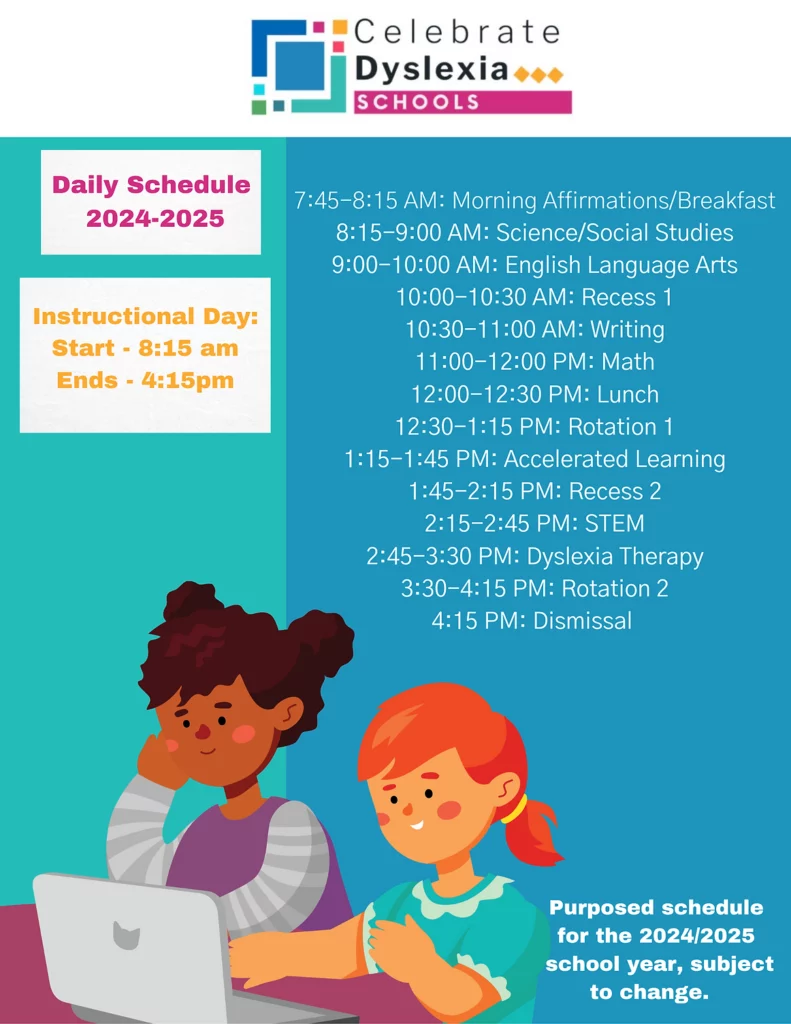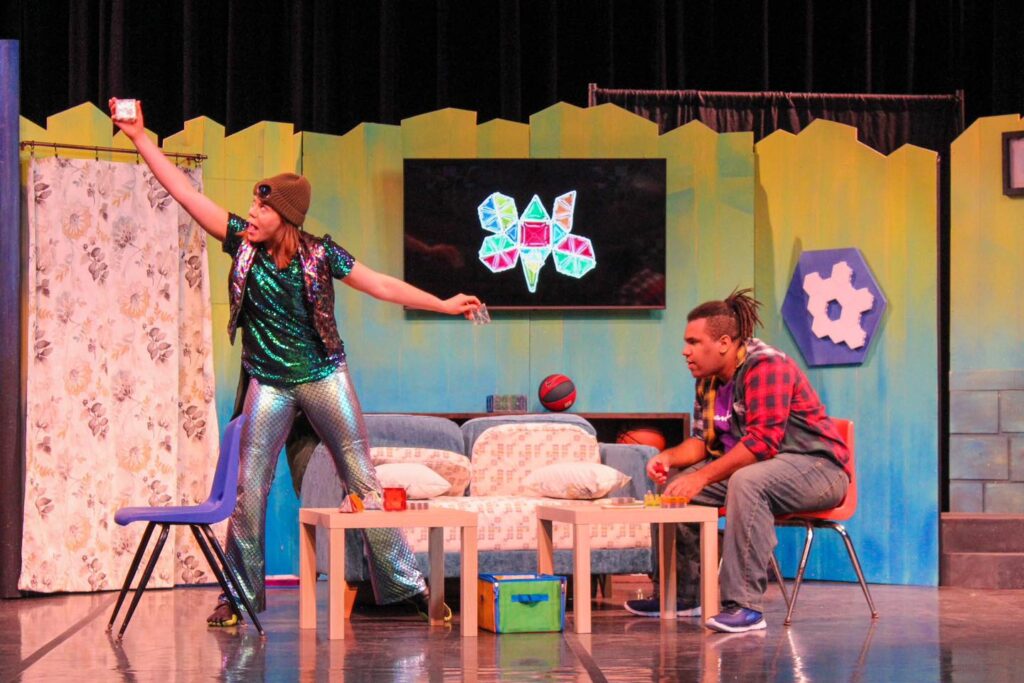
Celebrate Dyslexia Schools is an open enrollment charter school designed to provide a transformative educational experience for learners with dyslexia. Celebrate Dyslexia Schools is accepting applications for enrollment for the 2024–25 school year. We have put together a guide to help you learn more about Celebrate Dyslexia Schools and take steps to enroll your child for the next school year.
About Celebrate Dyslexia Schools
The mission of Celebrate Dyslexia Schools is to educate and support children and their families by expanding the use of evidence-based dyslexia interventions into historically marginalized communities. Their goal is to create an enriching, emotionally safe, culturally appropriate learning environment for all students, particularly those with dyslexia.
Dyslexia is an unexpected difficulty in reading for a person who has the intelligence to be a much better reader, most commonly caused by a difficulty in the phonological processing—the appreciation of the individual sounds of spoken language—which affects their ability to speak, read, and spell.
Dyslexia affects roughly 20 percent of the population. However, only a fraction of those students in our region are currently receiving dyslexia services. For most families, the process of pursuing private evaluations and intervention services is prohibitively expensive, and many families lack the knowledge to navigate traditional school systems to demand the necessary services for their children.
Jasmin Dean, the founder of Celebrate Dyslexia and Celebrate Dyslexia Schools, watched her son struggle in school. He wasn’t diagnosed with dyslexia until he was nine years old, and she wants to save other families from that struggle. She has built a community with a mission to celebrate, educate, and empower people with dyslexia. By raising community awareness and encouraging advocacy, Celebrate Dyslexia has a positive influence in changing the narrative around dyslexia. Celebrate Dyslexia Schools is one of several programs, including Dyslexia 101 presentations, that fulfill this mission and have a direct impact on educational processes for the next generation.
Celebrate Dyslexia Schools features a unique set of design elements that will meet the social, emotional and academic needs of the 1 in 5. They will offer structured literacy-centered education with a self-driven, strength-based approach. Classroom teachers will receive high quality training.
Students will receive emotional support throughout their school day. The first assumption from CDS staff will be that students want to learn. Through fidelity in implementing the IEP and accommodations, the academic model will ensure that students are able to learn.
Students will also experience enrichment in the community. During the inaugural year, when the school is co-located in The DoSeum, students will have access to museum exhibits as part of their learning.
At Celebrate Dyslexia Schools, the class size is capped at 12 students, this will ensure teachers are able to provide diagnostic instruction and build strong relationships with both students and families. The school will also offer a dual language program which will meet the linguistic needs of students. The school day includes two 30-minute recess blocks and a dyslexia therapy block.

To support these design elements, Celebrate Dyslexia Schools will employ a range of research-based pedagogical approaches, including structured literacy, multi-sensory, explicit classroom instruction, small group, personalized instruction, multiple methods to demonstrate mastery, and social emotional learning grounded in conscious discipline and positive behavior intervention supports that follow research-based practices.
To read more about Celebrate Dyslexia Schools in the news, we recommend that you click on the articles linked at the bottom of this post. Also, we invite you to join the San Antonio Charter Moms discussion group on Facebook and ask questions; the group includes parents and caregivers of dyslexic students who can comment with answers based on their own experiences.
Celebrate Dyslexia Schools in San Antonio
Celebrate Dyslexia Schools will serve students in kindergarten through second grade in 2024–25, expanding by one grade each year until it serves students in grades K–8. In its inaugural year, the school will be co-located at The DoSeum, San Antonio’s museum for children, while searching for a long-term location. The DoSeum is located at 2800 Broadway St., San Antonio, TX 78209 (map). The main phone number for the school is 210-942-8668, and you can contact Jasmin Dean at jasmin@celebratedyslexiaschools.org. This new school does not yet have a school report card or district report card.
You can find campus information about Celebrate Dyslexia Schools (and many other schools of choice) in our Guide to Charter Schools in San Antonio, including an interactive map.
Enroll at Celebrate Dyslexia Schools
Families can apply online to enroll their children at Celebrate Dyslexia Schools. For the 2024–25 school year, the open enrollment period and the lottery have already concluded. Families who apply over the summer for the upcoming school year may be placed on waiting lists until spots become available.
Celebrate Dyslexia Schools is an open enrollment charter school, which means that they are open to all students in the region who choose to apply. Their outreach efforts are focused on students with dyslexia, however, students who are not diagnosed with dyslexia can still apply and enroll. For those students, the school will support their growth towards even stronger reading skills.
Fill out this form to join the student interest list for Celebrate Dyslexia Schools and get updates about the school. In addition, Celebrate Dyslexia hosts events to provide information about topics such as dyslexia screening and diagnosis, evaluations, effective instruction, data collection, and dysgraphia. A good way to find out about these events is through social media: follow Celebrate Dyslexia Schools on Facebook, Instagram, and LinkedIn; also, follow Celebrate Dyslexia on Facebook, Instagram, and LinkedIn.
In addition, please join the San Antonio Charter Moms discussion group on Facebook to post questions and search previous discussions about Celebrate Dyslexia Schools.
Facts About the School and the Nonprofit
Celebrate Dyslexia Schools will open on August 12, 2024 and will be co-located at The DoSeum. The school will open serving students in kindergarten through second grade, and will expand by one grade level each year. Students are more likely to be diagnosed with dyslexia in kindergarten or first grade, prompting them to apply to a specialized school to serve students with dyslexia. The goal is that, after eighth grade, they will be prepared to attend their neighborhood public school or another charter school.
In 2022, Celebrate Dyslexia collaborated with the Magik Theatre on the world premiere of Eddie & Vinnie, a comic play for young audiences. Eddie is a young boy with dyslexia, and Vinnie is his best friend and pet gecko. Eddie struggles with his schoolwork and needs to bring his grades up, or else he may have to go to summer school. Vinnie seems bent on distracting Eddie while he is trying to partner with the new girl in class on a project. Looking at things another way, perhaps Vinnie is actually nudging Eddie to appreciate his own unique mind. The play is being produced by other theaters, including Childsplay in Arizona.

Celebrate Dyslexia also collaborated to produce an exhibit, Beautiful Minds: Dyslexia and the Creative Advantage, to help raise awareness about dyslexia. The exhibit appeared at The DoSeum from October 10, 2020 to March 28, 2021 and the Health Museum in Houston from September 18, 2021 to May 22, 2022.
Celebrate Dyslexia Schools is not the first charter school in Texas to focus on serving students with dyslexia. That distinction belongs to the Betty M. Condra School for Education Innovation, which opened in Lubbock in 2019.
If what you have learned so far about the Celebrate Dyslexia Schools gives you hope for your student with dyslexia or related issues, we recommend that you apply for enrollment now. You are also welcome to join the San Antonio Charter Moms discussion group to learn more and interact with families who also have dyslexic students.
Read More About Celebrate Dyslexia Schools
- “The DoSeum is San Antonio’s Children’s Museum,” Inga Cotton, San Antonio Charter Moms, June 3, 2024
- “Helping Kids Excel Academically,” KENS, April 25, 2024
- “Celebrate Dyslexia Schools,” Daytime, April 22, 2024 (also on News 4 San Antonio)
- “First charter school in San Antonio dedicated to students with dyslexia opens this fall,” Tiffany Huertas, KSAT, February 26, 2024
- “A new, 112-student charter school in San Antonio will teach dyslexic students how to thrive,” Isaac Windes, San Antonio Report, February 12, 2024
- “Charter Moms Chats — Celebrate Dyslexia Schools, With Flor Gutierrez And Jasmin Dean,” YouTube, December 3, 2023
- “Celebrate Dyslexia Schools receive charter approval in San Antonio,” Renata Kaminski, AL DÍA, July 3, 2023
- “Celebrate Dyslexia to open specialized charter school in San Antonio,” Isaac Windes, San Antonio Report, June 30, 2023
- “San Antonio will have a public charter school for students with dyslexia,” Elizabeth Sander, San Antonio Express-News, June 29, 2023
- “Magik Theatre play ‘Eddie and Vinnie’ will delight and educate,” Kristin Dean, KENS, October 17, 2022
- “Magik Theatre debuts first-ever children’s play with dyslexic main character,” Rebeca Gomez, San Antonio Report, October 14, 2022
- “Magik Theatre’s New Production: Eddie and Vinnie,” San Antonio Living, October 14, 2022
- “Magik Theatre’s production to cast new light on dyslexia,” Jack Morgan, Texas Public Radio, October 12, 2022
- “Celebrate Dyslexia Schools Will Educate Dyslexic Kids and Serve as a Center of Excellence,” Jasmin Dean, San Antonio Charter Moms, February 24, 2022
- “We should celebrate, educate, and empower people with dyslexia,” Jasmin Dean, San Antonio Report, September 21, 2021
- “Local girl featured in DoSeum exhibit that celebrates creative advantage of Dyslexia,” Alexsis Page, KSAT, March 21, 2021
- “DoSeum exhibit gets upgrades, will feature artwork by students with dyslexia,” Cody King, KSAT, February 26, 2021
- “A Love Letter to The DoSeum,” Jasmin Dean, Alamo City Moms, October 18, 2020
- “New exhibit at The DoSeum aims to raise awareness about dyslexia,” KSAT, October 12, 2020
- “The DoSeum aims to raise awareness about learning differences with new exhibit, lecture,” Ben Spicer, KSAT, October 2, 2020
- “One Mom’s Experience with a Dyslexia Simulator,” Bekah McNeel, San Antonio Charter Moms, June 24, 2020
- “Celebrate Dyslexia: Education, Identification, and Celebration of Dyslexic Students,” Bekah McNeel, San Antonio Charter Moms, June 10, 2020
- “Dyslexia and Related Disorders,” Texas Education Agency
